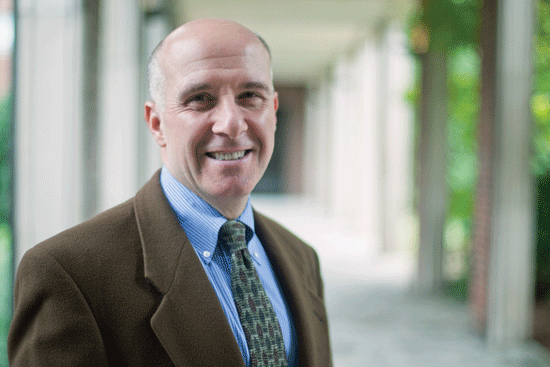Bruce Morrill researches the enigma of suffering

Consider a young mother. Say she is a practicing Christian, stricken with inoperable cancer and has six painful months to a year to live.
Is God punishing her for her sins? If not, why is this misfortune being visited on her and her loved ones? How are people who believe in a benevolent God supposed to interpret this and maintain their faith? Can religious faith comfort us when it seems there is no hope?
The work of Bruce Morrill, a Jesuit priest who joined the faculty of Vanderbilt Divinity School this semester as the Edward A. Malloy Chair of Catholic Studies, is centered on pain, suffering and death as individual and social phenomena. He calls it “where the rubber meets the road” when it comes to religion.
Morrill says theologian Johann Baptist Metz has best presented the big question as “What is God waiting for?”
“Are not the biblical promises of a new creation a word of salvation and redemption, of healing and deliverance … in our world?” Morrill asked. In other words, why not spare us from death and suffering now rather than promise paradise in an afterlife?
“One problem historically is that suffering has been held up as God’s way of teaching us something,” Morrill said. “That can become very sadistic, or on the other side it can become a masochistic practice of spirituality. This won’t do.”
A reinvigoration of Christian ritual is one thing that could help, Morrill believes. That doesn’t mean decorating for the holidays, he stresses, although he isn’t opposed to such lighthearted activities.
Important religious ritual – praying, church ceremonies and the like – are mindful of the meaning behind the actions and should dig much deeper than the rote exercise it sometimes deteriorates into, Morrill believes.
“Ritual is helpful precisely because it’s a performative action,” he said. “It’s an action that actually changes the circumstances for people – how they see their situation, how they understand themselves.”
Ritual can get the message across internally that we are not alone, Morrill believes. A sense of our individual fates being connected can spur us to treat each other and our environment with more compassion, he said.
In that way, ritual transforms into purposeful action that makes things better.
“[rquote]Christianity finds its real purpose in speaking a word or doing an action that really is a rescue or redemption or help,” he said.[/rquote] “That’s where things get real, to put it bluntly.”
Morrill disputes the notion that the soul is the important thing to nurture, ahead of the body.
“There’s been a pushback in recent decades against the idea that our bodies are mere shells or things that we own,” Morrill said. “If you eat all the sugar you want, you might end up with diabetes. There are consequences.
“Ecologically it’s the same trap – you can’t just do whatever you want and have faith that it will work out. Our bodies are related to the whole cosmos interacting with it, and it with us.”
Because illness and death are unpleasant, people tend to avoid dealing with such issues until they’re forced to do so.
“Death should not be left to the meaningless and the last and the desperate,” Morrill said. “The question becomes, ‘How is it that God can be encountered in this situation?’”
Morrill cites St. Thomas Aquinas, who said that what we know of God, we know by God’s actions.
“The way in which we know God is by the way in which we act that is Godly,” he said, adding a quote from the First Letter of John: “The one who says he loves God but hates his neighbor is a liar.”
So how does all this help our hypothetical terminally ill mother?
“All we can do there is respond, to help that person and her loved ones renegotiate their lives right now. In that comes the healing,” Morrill said.
Morrill has devoted his life to studying and teaching about these issues. He earned his Ph.D. in theological studies at Emory University and has spent the past 15 years teaching at Boston College. He has written three books, including Divine Worship and Human Healing and the upcoming Encountering Christ in the Eucharist: The Paschal Mystery in People, Word and Sacrament.
Morrill’s arrival in Nashville gives him the distinction of being the only Jesuit priest currently living in Tennessee. There are about 18,000 Jesuits internationally and 2,600 in the United States. These priests take vows of poverty, chastity and obedience. They cannot marry, they own nothing and any money they earn goes to the Jesuits.
“I turn in a budget and receive a monthly allowance to live on,” he said. “I can’t inherit. I dispensed my father’s inheritance to charity.”
During his time in Boston, Morrill lived in a house with 11 other priests. In Nashville, the Jesuits are renting him a condominium.
“It’s a solitary life,” he said. “But every kind of living has its own version of loneliness.”